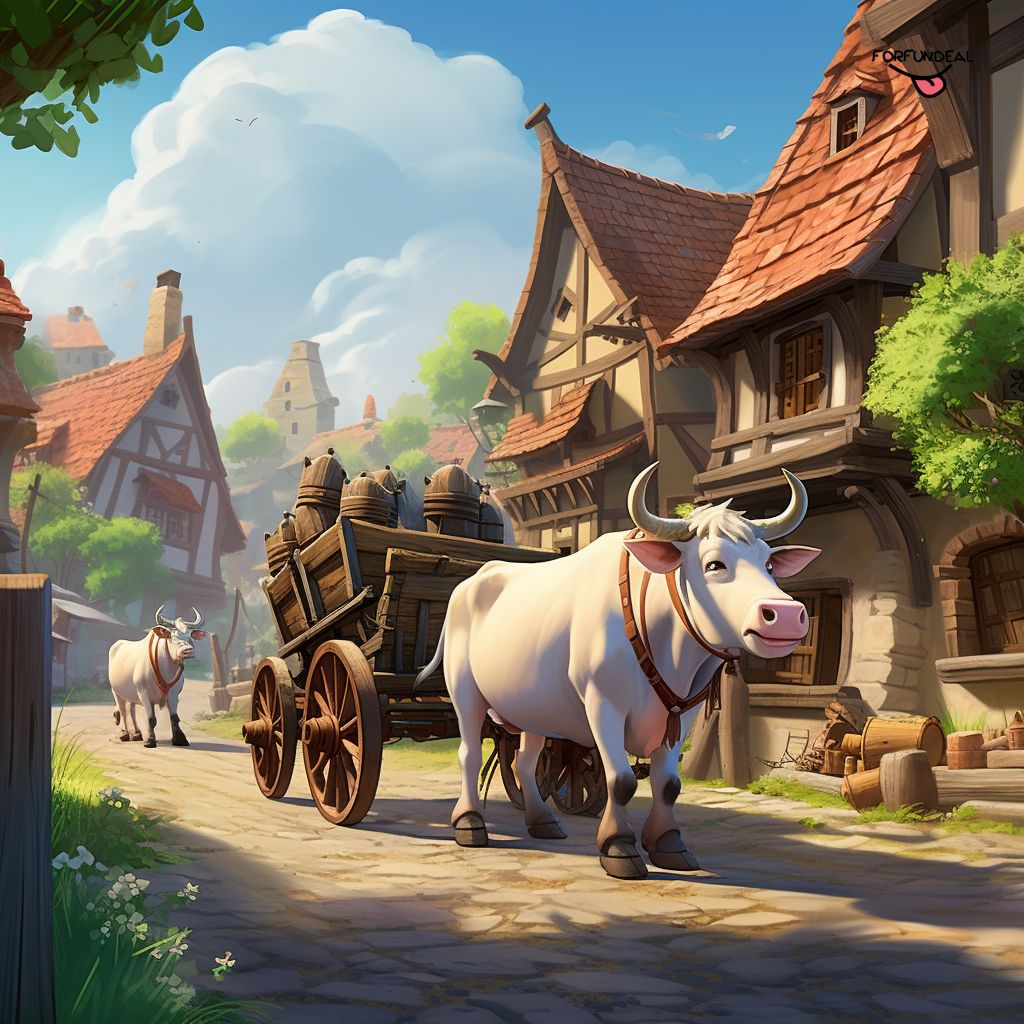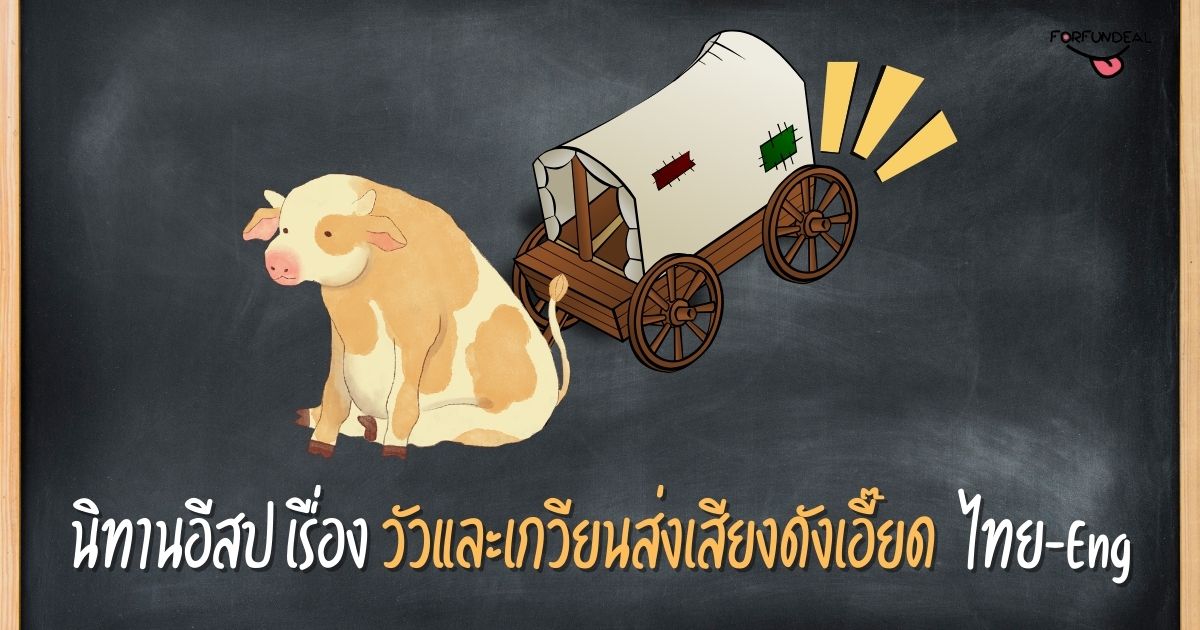“วัวและเกวียนส่งเสียงดังเอี๊ยด” ความพยายามมากกว่าคำพูดที่ว่างเปล่า ทำหน้าที่เป็นเครื่องเตือนใจไม่ให้พูดมากเกินไปโดยไม่มีการสนับสนุนที่มีความหมาย
นิทานอีสปเรื่องวัวและเกวียนส่งเสียงดังเอี๊ยด
กาลครั้งหนึ่งนานมาแล้ว ในหมู่บ้านอันเงียบสงบแห่งหนึ่ง วัวกลุ่มหนึ่งได้รับมอบหมายให้ทำหน้าที่ลากเกวียนหนักที่เต็มไปด้วยสินค้า ขณะที่มันเขาเดินไปตามทาง ชาวบ้านสังเกตว่าล้อเกวียนอันหนึ่งส่งเสียงเอี๊ยดน่ารำคาญ ซึ่งดังกว่าล้อเกวียนอื่นๆ มาก สิ่งนี้ดึงดูดความสนใจของชาวบ้านและนำไปสู่การถกเถียงกันว่าเหตุใดวงล้อจึงส่งเสียงดังเช่นนี้
Once upon a time, In a peaceful village, a group of oxen was assigned the task of pulling a heavy cart filled with goods. As they moved along, the villagers noticed that one particular wheel of the cart was making an annoying creaking sound, much louder than the others. This caught the attention of the villagers and led to discussions about why the wheel was making such a noise.
วัวรู้สึกไม่สบายใจกับความสนใจจึงตัดสินใจแก้ไขปัญหานี้ วัวตัวหนึ่งพูดขึ้นว่า “วงล้อที่เสียหายที่สุดจะส่งเสียงดังเอี๊ยดมากที่สุดเสมอ” วัวตัวอื่นๆ พยักหน้าเห็นด้วย โดยอ้างว่าเสียงดังมาจากสภาพที่แย่ของตัวล้อเอง
The oxen, feeling uneasy about the attention, decided to address the issue. One ox spoke up and said, “The worst wheel always creaks most.” The others nodded in agreement, attributing the noise to the poor condition of the wheel itself.
เมื่อเวลาผ่านไป ชาวบ้านเริ่มตระหนักว่าคำพูดของวัวนั้นมีความหมายลึกซึ้งยิ่งขึ้น พวกเขาตระหนักว่าเช่นเดียวกับที่ล้อส่งเสียงดังไม่จำเป็นต้องแย่ที่สุดในชีวิต คนที่พูดดังที่สุดก็ไม่ใช่คนที่มีความรู้หรือมีประสบการณ์มากที่สุดเสมอไป คำพูดนี้กลายเป็นเครื่องเตือนใจให้ชาวบ้านระวังคนที่พูดด้วยความมั่นใจแต่ไม่มีสาระ
As time passed, the villagers began to realize that the oxen’s statement held a deeper meaning. They realized that just as the squeaky wheel wasn’t necessarily the worst, in life, those who talk the loudest aren’t always the most knowledgeable or experienced. The saying became a reminder for the villagers to be cautious of those who speak with great confidence but lack substance.

นิทานเรื่องนี้สอนให้รู้ว่า
“คุณค่าของเนื้อหามีมากกว่าการพูดไร้สาระ และมองเห็นคุณค่าของคำพูดและการกระทำ…”
- ความเงียบอันชาญฉลาด: เรื่องราวสอนว่าบางครั้ง การนิ่งเงียบและรับฟัง ดีกว่าการพูดออกมาโดยไม่เข้าใจบริบททั้งหมด
- คุณค่าของประสบการณ์: เสียงและความคิดเห็นที่ดังไม่ได้สะท้อนถึงภูมิปัญญาหรือความรู้เสมอไป สิ่งสำคัญคือต้องพิจารณาเนื้อหาเบื้องหลังคำ
- ระวังคำพูดที่ว่างเปล่า: วงล้อที่ดังเอี๊ยดทำหน้าที่เป็นอุปมาของการพูดคุยที่ว่างเปล่า สิ่งนี้กระตุ้นเราให้มีความเข้าใจและไม่ถูกชักจูงด้วยคำพูดที่ฉูดฉาดซึ่งไม่มีแก่นสาร
- ความอ่อนน้อมถ่อมตน: คำกล่าวง่ายๆ ของวัวสะท้อนถึงคุณค่าของความอ่อนน้อมถ่อมตน เป็นสิ่งเตือนใจว่าผู้รู้จริงมักไม่จำเป็นต้องโอ้อวด
- การรับรู้มีความสำคัญ: การเปลี่ยนแปลงของชาวบ้านในการรับรู้เกี่ยวกับวงล้อที่ดังเอี๊ยดแสดงให้เห็นว่าความเข้าใจของเราเกี่ยวกับสถานการณ์สามารถพัฒนาและนำไปสู่ความเข้าใจที่ลึกซึ้งยิ่งขึ้นได้อย่างไร
- การตัดสินอย่างไตร่ตรอง: ก่อนที่จะสร้างความคิดเห็นหรือตัดสินตามรูปลักษณ์ภายนอกเพียงอย่างเดียว สิ่งสำคัญคือต้องพิจารณาปัจจัยที่ซ่อนอยู่
“Value substance over empty chatter and to discern the worth of words and actions.”
- Wise Silence: The story teaches that sometimes it’s better to stay quiet and listen rather than speaking out without understanding the full context.
- Value of Experience: Loud voices and opinions don’t always reflect wisdom or knowledge. It’s important to consider the substance behind the words.
- Beware of Empty Talk: The creaking wheel serves as a metaphor for empty chatter. It encourages us to be discerning and not be swayed by flashy talk that lacks substance.
- Humility: The oxen’s simple statement reflects the value of humility. It’s a reminder that those who truly know often don’t need to boast.
- Perception Matters: The villagers’ shift in perception about the creaking wheel illustrates how our understanding of a situation can evolve and lead to deeper insights.
- Thoughtful Judgment: Before forming opinions or making judgments based solely on outward appearances, it’s important to consider underlying factors.
บทเรียนเหนือกาลเวลาของเรื่องราวนี้แนะนำให้เราฟัง ประเมิน และแสวงหาความลึกนอกเหนือจากรูปลักษณ์ภายนอก โดยเตือนเราว่าเสียงที่ดังที่สุดไม่ใช่เสียงที่รอบรู้ที่สุดเสมอไป

